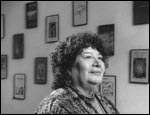A Labor of Love, a Publishing Marathon
Professor Norma Alarcon's Berkeley-Based Third Woman Press Turns 20
By Cathy Cockrell, Public Affairs
Posted May 12, 1999
 Above: Covers of books from Third Woman Press adorn the Barrows Hall office of Professor Norma Alarcon, the press's founder and publisher. Below: Third Woman released "Living Chicana Theory," edited by Berkeley staffer Carla Trujillo, in 1998. Jane Scherr photo. |
That was back in the mid-'80s, when her labor of love, Third Woman Press, was struggling and young. "It stuck with me," says Alarcon, professor and chair of women's studies at Berkeley, and professor of ethnic studies, Spanish and Portuguese. "These are the realities of alternative press: that regardless of setbacks and mishaps, if I stuck with it, it would eventually have some impact."
She did stick with it. And this year -- many setbacks, mishaps, deadlines and press runs later -- Alarcon's pioneering publishing house turns 20, having put out more than 30 books and launched and supported dozens of Chicana, Latina and other women of color writers.
For most of the past two decades, Alarcon has been too busy editing, proofreading, planning distribution or reading manuscripts to take note of her press' accomplishments. Then about three years ago, she framed book covers from Third Woman and hung them on her office walls in Barrows Hall.
"All of a sudden, as I looked at it, I said 'Wow! This is incredible! You have to celebrate this!' It was the first time I had really stopped to look," she recalls. "I got an overwhelming feeling of ecstasy."
Third Woman Press began originally as an antidote to loneliness, when Alarcon -- a specialist in feminist critical theory, cultural criticism, and studies of Chicana/Latinas and women of color -- was doing graduate work in Bloomington, Indiana. Born in Mexico near the Texas border and reared in San Antonio, then Chicago, she says she realized that "there weren't enough women of color or Latinas in Bloomington for me to have a conversation with."
To overcome her isolation, she wrote poetry, reached out to other women writers of color, and launched a journal on literature and art. "I was looking for friendship," she says.
Alarcon got what she was looking for -- and more. As Third Woman took form, she soon developed contacts, an editorial board, and writers eager for publication.
"It was extremely difficult to meet printing bills," she recalls of the press's beginnings. "In the early days, we did our covers in black and white." Only later could Third Woman afford to spend a little more to have attractive covers and feature women of color artists.
When Alarcon joined the Berkeley faculty in 1987, Third Woman Press moved west with her -- by this time producing books of fiction, criticism and poetry. Though a small press typically focuses on remaining solvent rather than turning profits, its catalog now includes several commercial successes. Among them is "My Wicked, Wicked Ways," a book of poetry by MacArthur Award-winner Sandra Cisneros, for which Random House bought the hardcover rights. Another is "Sexuality of Latinas," coedited by Ana Castillo, which has been reprinted several times.
For 1999, Third Woman has four new books in the works -- each occupying a space on the floor of Alarcon's home office. She has also assigned herself a more ambitious task: to "get a second vision" for the press and "rethink the project, in the spirit that has existed for 20 years.
"Many men, and some women, would not agree with me," Alarcon says of her literary vision. "But I have seen Third Woman Press as an activist vehicle, within the range of my talents and abilities.
"Sometimes if you're not out there speaking into a microphone, you may not be thought of as an activist," says Alarcon. "But activism can take many forms."
![]()
![]()
May 12 - June 8, 1999 (Volume 27, Number 34)
Copyright 1999, The Regents of the University of California.
Produced and maintained by the Office of Public Affairs at UC Berkeley.
Comments? E-mail berkeleyan@pa.urel.berkeley.edu.